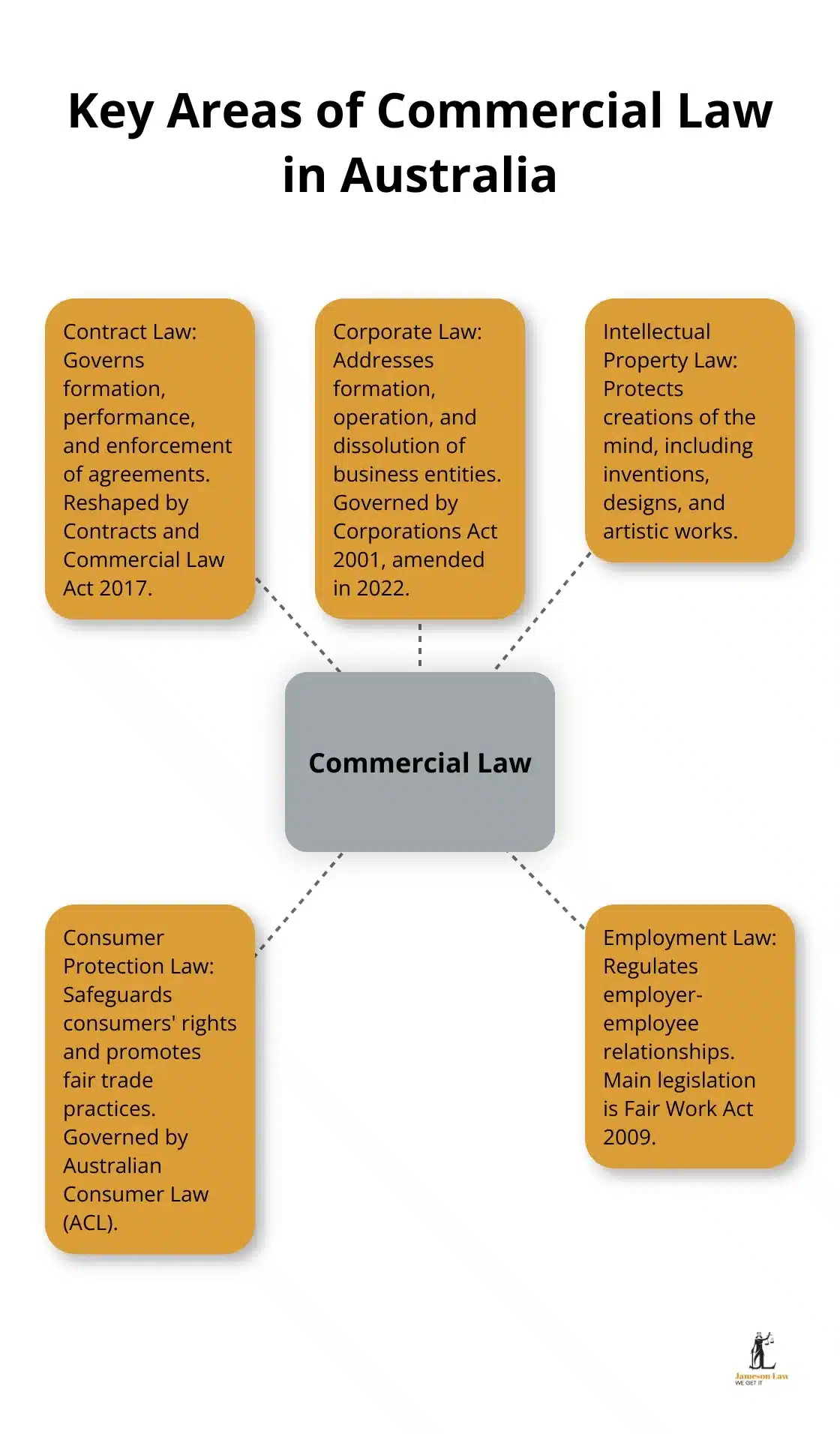Commercial law is a complex and ever-evolving field that demands expertise and constant vigilance. At Jameson Law, we understand the challenges legal professionals face when striving to master commercial law.
This blog post will provide essential tips and strategies to help you navigate the intricacies of commercial law, develop crucial skills, and stay ahead of industry trends.
Key Areas of Commercial Law in Australia
Contract Law: The Foundation of Commercial Transactions
Contract law forms the bedrock of commercial law. It governs the formation, performance, and enforcement of agreements between parties. The Contracts and Commercial Law Act 2017 reshaped Australia’s commercial landscape by consolidating multiple existing acts. Legal professionals must understand the elements of a valid contract: offer, acceptance, consideration, and intention to create legal relations.
Practical tip: create a contract review checklist covering parties’ details, payment terms, termination clauses, and dispute resolution mechanisms. This systematic approach helps you avoid overlooking crucial details.
Corporate Law: Understanding Business Structures
Corporate law addresses the formation, operation, and dissolution of business entities. The Corporations Act 2001 is the primary legislation governing corporate law in Australia. It was amended in 2022 to include technology-neutral provisions. Understanding business structures (sole proprietorships, partnerships, and corporations) and their implications is vital.
For practical exposure, review resources from the Australian Securities and Investments Commission (ASIC) and volunteer with small businesses to gain insights into corporate governance documents and structures.
Intellectual Property Law: Safeguarding Innovation
Intellectual property (IP) law protects creations of the mind. Relevant legislation includes the Patents Act 1990, Trade Marks Act 1995, and Copyright Act 1968.
Practical tip: conduct mock IP audits, identify assets, and assess their protection status. For official guidance, consult IP Australia.
Consumer Protection Law: Ensuring Fair Trade Practices
Consumer protection law safeguards consumer rights and fair trading. The Australian Consumer Law (ACL) is the central legislation in this field. The Federal Government has proposed stronger prohibitions and penalties under the ACL.
Tip: study recent ACCC enforcement actions to understand how breaches are handled and their implications for businesses.
Employment Law: Navigating Workplace Relations
Employment law governs employer-employee relationships. The Fair Work Act 2009 sets minimum standards, unfair dismissal protections, and enterprise bargaining rules.
Tip: draft mock employment contracts to ensure compliance with current legislation. Refer to the Fair Work Ombudsman for official templates and guidance.

How to Sharpen Your Commercial Law Skills
Analytical Thinking and Problem-Solving
Commercial law involves complex scenarios with competing interests. Develop strong analytical and problem-solving skills through case study analysis and reviewing recent decisions on AustLII.
Tip: participate in moot court competitions for simulated real-world practice.
Mastering Negotiation and Communication
Clear communication and effective negotiation are vital in commercial law. Improve skills through specialised negotiation courses and by volunteering at community legal centres.
Attention to Detail and Risk Assessment
Even small oversights can have major consequences in commercial law. Create due diligence and compliance checklists for transactions.
Tip: consult industry risk management guides from business.gov.au to improve risk assessment skills.

Staying Ahead in Commercial Law
Use Technology for Legal Updates
Stay current by using platforms like LexisNexis and free resources like AustLII. Set up alerts for legislative changes and new cases relevant to commercial law.
Read Industry Publications
Read the Law Society Journal and the Australian Law Journal for updates and analysis. Newsletters from trusted publishers like Wolters Kluwer also offer tailored summaries.
Build a Professional Network
Attend events hosted by the Law Council of Australia and join associations like the Business Law Section. Online communities such as LinkedIn groups can also be valuable for staying engaged with peers.
Continuous Professional Development
Engage in continuing legal education (CLE) programs to stay ahead. Consider postgraduate study such as an LLM in Commercial Law for deeper expertise.

Final Thoughts
Mastering commercial law requires combining legal knowledge with practical skills and continuous learning. Legal professionals must refine analytical thinking, negotiation, and risk assessment, while also staying current with industry developments.
At Jameson Law, our solicitors provide expert guidance in commercial law matters including contract disputes, corporate governance, and intellectual property concerns. With tailored support, you can confidently navigate the complexities of Australian commercial law.













